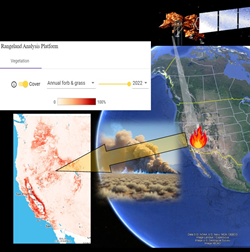Webinar
Webinar recording.
Join the authors to learn more about how media in all forms can report diverse stories of fire, including strategies for physical and mental preparedness, engaging with incident personnel, and using scientific knowledge. Participants will also have the opportunity to provide feedback and suggest future ways to further enhance the capacity of media, public information officers, and scientists to work together.
Webinar b.
Presenters will share an overall framework, analysis considerations plus a case study from the Southwest Idaho Wildfire Crisis Landscape. Manager questions and experiences to guide this session are encouraged.
Webinar recording.
Cara Applestein, Samuel “Jake” Price, and Matt Germino, USGS, present their latest work on accuracy assessments of the newest mapped products for burned areas. They will give guidelines for reliable application, including stating what is “unsafe” application, what the scientific basis for the guidelines are, and examples of how they use the data. They will address RAP, RCMAP, and LandCart.
Webinar recording.
Science to support the Wildfire Crisis Strategy
Land management-focused panel discussion with smoke experts
Hosted by the USDA Forest Service Rocky Mountain Research Station
View webinar recording.
The South Central Climate Adaptation Science Center (SC CASC) highlighted one of their funded projects, Time to Restore: Connecting People, Plants, and Pollinators, through the webinar series – The Southern Plains Climate Science Webinar Series.
Watch to learn how this project involves the pollinator restoration community through the entire process to assist them with climate-informed guidance on the timing of nectar plant flowering and seeding. Better knowledge of climate impact on flowering and seed timing for critical nectar plants can inform more resilient restoration plantings.
Jane Breckinridge, the Director of the Tribal Alliance for Pollinators, and Erin Posthumus, the Outreach Coordinator for the USA National Phenology Network and the Principle Investigator of this SC CASC-funded project, will share their perspectives on this project which recently received a second funding award to continue their work.
View webinar recording.
The National CASC hosted a webinar series on how to integrate Indigenous Knowledges (IK) into Federal research and resource management programs. It ran bi-weekly from April 6 to June 1, 2023 and centers Indigenous voices to explore ethical, legal, and scientific considerations for working within different knowledge systems and provides guidance reflecting best practices.
View webinar recording.
Zander Evans will present an overview of the 10 largest fires in the Southwest during 2022. He will share summaries of forest types and burn severities for each of the 10 fires. Rich Naden, Fire Weather Meteorologist with National Park Service, will discuss the fire season outlook for the Southwest in 2023.
Access the webinar series.
The Yellowstone fires of 1988 are considered an early fire event signaling the rise of the wildfire crisis we are experiencing today. After building for decades, the crisis erupted in the 2000s as wildfires destroyed lives, homes, and communities on a rising scale. The national response, though initially swift, has not kept pace with the growing impact of catastrophic wildfires. In January 2022, Secretary of Agriculture Tom Vilsack announced a 10-year strategy for confronting the wildfire crisis in the United States (Confronting the Wildfire Crisis: A Strategy for Protecting Communities and Improving Resilience in America’s Forests).
At the core of the strategy is ramping up fuel and forest health treatments across land ownerships to match the scale of wildfire risk. The U.S. Department of Agriculture (USDA) Forest Service and the wildland fire community have laid the foundation for collaboration across landscapes to reduce wildfire risk. Recent influxes in funding, including new funding authorities in the Bipartisan Infrastructure Law and the Inflation Reduction Act, are helping fuel and forest health projects hit the ground on priority landscapes and high risk “firesheds.”
For decades the Rocky Mountain Research Station has focused on fire science studying topics relevant to wildfire hazard, risk, behavior, and ecology, and providing knowledge support to land managers and a myriad of partners. The expertise and tools developed over decades by RMRS is now central to providing a scientific basis to addressing the Wildfire Crisis Strategy. This series of hour-long seminars took place January 12 – March 23, 2023, to share the individual contributions of RMRS scientists to the Wildfire Crisis Strategy.
Webinar recording.
In this LANDFIRE Office Hour, Kim Ernstrom, and Wendy Detwiler, Wildland Fire Management RD&A, Technical Leads IFTDSS (and Josh Hyde: Tech Transfer Specialist, University of Idaho) discuss the basics of using IFTDSS for fuels planning. We also discuss practical examples of how IFTDSS is being used in the field.
Webinar recording.
The Bureau of Land Management (BLM), in collaboration with the Society of Ecological Restoration’s International Network for Seed-based Restoration (SER-INSR), The Nature Conservancy (TNC), and Holden Films, produced a series of educational documentaries that explore each step of the native seed supply chain in one of the largest and most sophisticated native seed markets in the world, the Western United States. Episodes of the nine-part series have been released weekly throughout the summer (June 29 – August 24, 2023) and can be viewed on ser-insr.org/native-seed-film.
In this webinar, representatives from BLM, SER-INSR, TNC, and Holden Films will discuss the production of the video series from both a scientific and cinematographic perspective and share stories of this incredible journey.
The panel discussion will be followed by a Q&A session with the audience.



